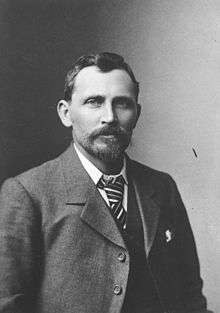John Cann
| John Cann | |
|---|---|
 John Cann in 1902 | |
| 32nd Colonial Treasurer of New South Wales | |
|
In office 6 May 1912 – 29 Jan 1914 | |
| Premier |
James McGowen William Holman |
| Preceded by | Ambrose Carmichael |
| Succeeded by | William Holman |
| Member of the New South Wales Parliament for Sturt | |
|
In office 20 June 1891 – 25 June 1894 | |
| Preceded by | Wyman Brown |
| Succeeded by | William John Ferguson |
| Member of the New South Wales Parliament for Broken Hill | |
|
In office 17 July 1894 – 6 November 1913 | |
| Preceded by | New district |
| Succeeded by | District abolished |
| Member of the New South Wales Parliament for Sturt | |
|
In office 15 November 1913 – 20 December 1916 | |
| Preceded by | Arthur Hill Griffith |
| Succeeded by | Percy Brookfield |
| Personal details | |
| Born |
19 April 1860 Horrabridge, Devonshire, England |
| Died |
21 July 1940 (aged 80) Petersham, New South Wales, Australia |
| Political party | Australian Labor Party |
| Spouse(s) | Eliza Ann Callard (1885-1940) |
| Relations | George Cann |
| Children | Nil |
| Occupation | Miner |
| Religion | Methodism, Congregationalism |
John Henry Cann (19 April 1860 – 21 July 1940) was a New South Wales politician, Treasurer, and Minister of the Crown in the cabinets of James McGowen and William Holman.
Background
Cann was born in 1860 in Horrabridge, Devonshire, moving with his family to Northumberland in 1866.[1] At the age of nine he began work in the coal mines. He moved to London in 1882 and migrated to Australia in 1887 following his marriage in 1885. After a brief period working as a coal miner at Port Kembla Cann moved to Broken Hill where he worked as a miner for BHP.[1] He was also a Primitive Methodist lay preacher at this time.
Political career
Cann was elected president of the local branch of the Amalgamated Miners' Association (A.M.A.) in early 1890, defeating the more radical previous president, Richard Sleath.[2] When the AMA formed a local branch of the Labor Electoral League in 1891 Cann was preselected as candidate for the state parliament seat of Sturt and elected in the same year.[1] Cann was elected unopposed as the sitting member, Wyman Brown, decided to retire after local unions passed a motion of no confidence in him. Other labour candidates including Sleath (then serving as AMA secretary) and William Ferguson (supported by the Barrier Ranges Trades and Labour Council) withdrew from the contest once it was clear Cann had the majority support of local unions.[2]
Cann faced significant local problems once elected. The far west of New South Wales was in a severe drought, and Broken Hill had no secure source of fresh water. Cann was able to persuade the Premier, Henry Parkes, to commission emergency supplies of water brought in from South Australia by train.[2]
An even more significant problem emerged with the defeat of the local union movement in 1892 miners' strike. The 18 week strike saw local union leaders arrested and imprisoned in Sydney and strikebreakers brought in to replace striking miners. Union membership collapsed following the defeat and many of the working conditions won in previous years were lost.[2]
While the defeat of the strike was a significant setback for the unions in Broken Hill, politically Labour was very successful in the 1890s. Cann was able to persuade the Dibbs government to divide the Electoral district of Sturt into three new seats, Alma, Broken Hill and a redrawn Sturt. Labour polled over 70 percent in all three new seats at the 1894 election, with Cann winning Broken Hill.[2]
Cann served as Labor's central campaign director for the 1897 election to the Federation Convention. Labor opposed the 1897 federation proposal, instead advocating a unicameral legislature elected by universal suffrage. This opposition to federation was controversial locally, and although the "No" vote was successful, it caused significant internal conflict within the Labor party in the far west.[2]
Cann continued to serve as MLA for Broken Hill until the seat was abolished in 1913, when he returned to the seat of Sturt. From 1912 to 1914 he was the Treasurer of New South Wales. He finally resigned from parliament in 1916 after local unionists passed a motion of no confidence in him. He was succeeded as the member for Sturt by the more radical Percy Brookfield.[3]
References
- 1 2 3 Nairn, Bede (1979). "Cann, John Henry (1860–1940)". Australian Dictionary of Biography. National Centre of Biography, Australian National University. Retrieved 17 March 2013.
- 1 2 3 4 5 6 Ellem, Bradon; Shields, John (2006). "Chapter 11: The Far West". In Hagan, Jim. People and Politics in Regional New South Wales. 1, 1856 to 1950s. Leichhardt: The Federation Press. pp. 294–326. ISBN 978 186287 571 5.
- ↑ "Mr John Henry Cann (1860 - 1940)". Members of Parliament. Parliament of New South Wales. Retrieved 27 December 2010.
| Parliament of New South Wales | ||
|---|---|---|
| Preceded by Wyman Brown |
Member for Sturt 1891 – 1894 |
Succeeded by William John Ferguson |
| New district | Member for Broken Hill 1894 – 1913 |
District abolished |
| Preceded by Arthur Hill Griffith |
Member for Sturt 1913 – 1917 |
Succeeded by Percy Brookfield |
| Political offices | ||
| Preceded by Ambrose Carmichael |
Colonial Treasurer of New South Wales 1912 – 1914 |
Succeeded by William Holman |